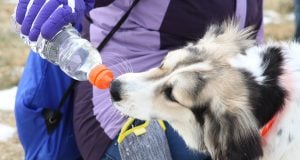
Table of Contents
The phrase “something smells like a wet dog” is commonly used in describing nasty smells.
And when your dog has a bad odor, you are not the only one to notice.
When you ask, “Why does my dog stink,” there could be a number of causes. Fortunately, it's all easily fixable.
Remember that all dogs have unique aromas, and some breeds are smellier than others.
That aroma comes from their skin oil.
Dogs sweat through their paws, which is why they may not smell like a bed of roses. But nasty smells elsewhere can also indicate serious illnesses or diseases.
Why Does My Dog Stink?
1. Anal Glands
Anal glands are present in the dog's anus containing an oily marking sent.
Each time a dog has a bowel movement, some of that oil is released.
When these become infected, the resulting scent is nasty, and it could also be painful for the dog.
Your vet may need to express the dog's glands, or they can show you how to do so at home to get rid of the odor.
2. Bedding and Toys
Make sure to wash your dog’s bedding and toys regularly.
They will start to smell, and that affects the way your dog and the entire home smell.
Chew toys in particular need care as your dog puts these in their mouth, transferring the aroma and dirt.
3. Diet
When a dog’s food intake is high in carbohydrates and foods with filler/additives, it changes the body’s chemistry and may cause smelly skin or mouth.
To prevent this, use high-protein foods. If your dog is allergic to such foods, you may have to try various brands until you hit the perfect nutritional balance.
4. Doggy Breath
Bad breath in dogs comes from a buildup of bacteria in your dog’s mouth, and it's more common when you ignore the dog's dental health.
If there is a problem with your pet's lungs or intestinal tract, that may also manifest in bad breath.
Certain diseases like diabetes and kidney disease change the way Fido’s breath smells, too.
Generally, diseased teeth and gums are the main cause of foul smell along with excess drooling. The drool carries that aroma to everything it touches.
Fortunately, there are simple ways to make a dog's breath smell better. One of the easiest is water additives.
You should brush your pet’s teeth once a day to keep the buildup at a minimum and make an appointment for a full dental cleaning once or twice a year.
There are also dental chews and bones that will help ease normal dog breath, and your dog thinks it’s a treat.
5. Ear Infection
Dogs' ears, especially long droopy ones like those on Basset Hounds, can gather moisture, and in turn begin smelling yeasty.
Sometimes, you’ll just need to clean their ears out with a dog ear cleaner. Other times, more intervention is required.
If the smell from your dog's ears is overpowering, resembling old, spoiled milk, it’s time for a trip to the vet.
It’s quite possible that your canine companion has a bacterial infection, which really kicks up a stench.
Your dog may also be scratching their ears or shaking their head, both of which imply an infection is present.
This is best checked by a veterinarian.
If you’re seeking a home remedy instead, you can make your own homemade ear cleaner: try apple cider vinegar and water, or witch hazel, and spray it lightly in the ear. Apply a warm compress afterward.
6. Flatulence
Periodic tummy burbles in a dog are normal.
Foods that often cause your dog to have gas include mostly human foods: peas, beans, foods high in fat, or dairy products.
Occasionally, kibble can do this, too, so read your dog food labels to see if any of those “gassy ingredients” are present.
It might only require a change of food to fix this.
If, however, your dog has excessive and putrid gas, there could be a health problem, most likely related to digestive disorders or your pet not tolerating their meals well. Bring this up to your vet.
7. Grooming
Your dog’s fur needs a good grooming schedule to keep it from stinking. Giving a dog a good bath every 4-6 weeks should do the trick.
If you can’t manage that yourself, seek out a reliable pet groomer.
Brush your dog between baths to loosen dead skin, dirt, and saliva. That alone will improve the way your pup smells.
8. Rolling, Rolling, Rolling
While it seems terrible to human counterparts, some dogs love rolling in the yard – dirt, grass, sand, mud, and whatnot.
What they encounter during these jaunts can be quite unpleasant. Your dog is just trying to cover other scents from what they perceive as another animal encroaching on their territory.
9. Skin Problems
There are many skin conditions in dogs that may cause bad aromas. A common one is seborrhea that smells rather musty or like blue cheese.
Seborrhea results from a yeast build-up on the dog’s skin. A routine of bathing, medicine, and ear cleaning is the only answer to this problem.
Breeds that have overlapping skin folds are prone to smells because the interior of the folds easily retain moisture.
This causes dermatitis and infections. Keep those folds clean and dry, but consult with your vet about the best regimen so you don’t remove healthy oils in the process.
Hormonal imbalance, fungus, skin allergies, parasites, or an infection in an unnoticed region of the skin may also make dogs stink. Your dog may itch more or lick incessantly.
10. Skunk
If your dog is unfortunate to startle a skunk, you will end up with a stinky dog. The skunk’s smell can linger for as long as a year if you don’t get it all out.
A dog’s face is usually where skunk spray lands.
When this happens, rinse your dog’s eyes with cool water, and then it's time to fight off the skunk smell.
There are several anti-skunk home treatments you can use for alleviating skunk smell, but you will need to use them more than once.
1st method: Start with a mix of dish soap, baking soda, and hydrogen peroxide.
To one tsp dish soap, add ¼ cup of baking soda and a full quart of hydrogen peroxide. Put this blend on your dog’s coat and leave it for 20 minutes.
Now, give your dog a bath using regular dog shampoo, rinsing very well. Two or three more times of this should do the trick.
2nd method: Wash your dog using the regular pet shampoo product.
Dry the dog, then start applying tomato juice. Make sure it all sinks into the skin.
Leave it there for 15 minutes, rinse and repeat. (Owners of white dogs should not panic if the pet's fur turns slightly orange – this will go away quickly.)
Beyond this, you can certainly buy a product specifically designed to tackle skunk spray on dogs.
Your vet or a nearby pet supply store can offer recommendations, but some of the best brands for this are Bodhi Dog and Nature's Miracle.
11. Urinary Tract Infection
A strong scent of urine on your dog may reveal a urinary tract infection. These are more common than you may think.
Other signs of an infection include increased thirst, more trips than normal outside, or signs that the dog is feeling pain while urinating.
Any abnormal urine smell coming from your dog should be reported to the vet. Other reasons that this smell might occur include diabetes, fungal infections, or kidney stones or kidney disease and failure.
12. Wet Dog
Your pooch may smell perfectly fine before a bath, but during and after the bath, it is a completely different matter.
The reason wet dogs smell bad is because it releases old oil, yeast, dirt and other microorganisms into your dog’s fur as you wash them.
Make sure your dog is dried thoroughly after the bath, and that will go away.
You can also use a dog conditioner with an inoffensive smell or a pet perfume to make your pup smell better.
READ NEXT: How to Make a Dog Smell Good
Disclosure: We may earn affiliate commissions at no cost to you from the links on this page. This did not affect our assessment of products. Read more here and find full disclosure here.
Want to share this?













